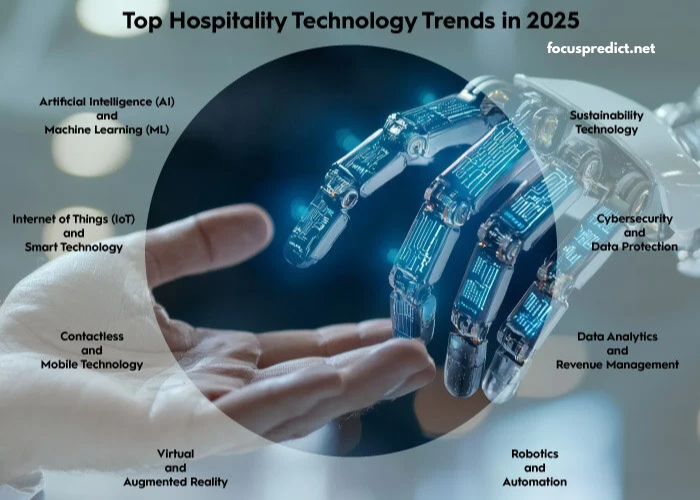The world of technology is evolving at a breakneck pace. As we step into 2025, businesses, governments, and individuals are experiencing massive digital transformations that are reshaping how we live and work. From artificial intelligence to quantum computing and sustainable tech, the upcoming trends are set to revolutionize industries across the globe.
This comprehensive guide dives into the most influential technology trends to watch in 2025, exploring how and why they matter.
The Rise of Artificial Intelligence 2.0
Enhanced Machine Learning Models
In 2025, AI is no longer just a tool for automation — it’s becoming more human-centric, intuitive, and responsive. Enhanced machine learning (ML) models, especially in natural language processing and computer vision, are delivering unprecedented results in sectors like healthcare, finance, and customer service.
With models like GPT-5 and beyond, expect AI to become more context-aware, culturally intelligent, and emotionally responsive.
Explainable AI (XAI)
One major shift in AI technology is the demand for transparency. Explainable AI allows users to understand how decisions are made, especially in sensitive applications like law enforcement, healthcare, and lending. In 2025, XAI is not just a preference but a necessity, driven by ethical AI frameworks and increasing regulatory scrutiny.
Quantum Computing: Beyond the Hype
Real-World Applications Coming to Life
Quantum computing has long been a theoretical dream, but 2025 is the year we start seeing practical applications. From drug discovery to cryptographic security and financial modeling, quantum computers are solving problems that classical computers cannot handle efficiently.
Rise of Quantum-as-a-Service (QaaS)
Cloud-based quantum platforms are making this powerful tech more accessible to enterprises. Tech giants like IBM, Google, and emerging startups are offering QaaS models, democratizing access to quantum resources for businesses of all sizes.
5G and the Road to 6G
Full Global Rollout of 5G
The global 5G rollout reaches its maturity in 2025, offering ultra-low latency and high-speed connectivity. This revolution in mobile internet powers real-time applications such as AR/VR, remote surgeries, smart factories, and connected vehicles.
Laying the Groundwork for 6G
While 5G continues to expand, the tech world is already preparing for 6G — expected to emerge by the end of the decade. Early 6G research is focusing on terahertz frequency bands, advanced beamforming, and intelligent spectrum sharing.
The Future of Work: Remote, Hybrid, and AI-Enhanced
Digital Workspaces Powered by AI
Remote work is no longer just a pandemic-induced trend. In 2025, AI-powered digital workspaces help streamline workflows, automate mundane tasks, and facilitate deeper collaboration. Tools now include virtual assistants, sentiment analysis, and predictive scheduling.
Virtual and Augmented Reality Integration
Immersive collaboration through VR and AR is replacing traditional video conferencing. Virtual meeting rooms, interactive whiteboards, and spatial computing tools are fostering stronger engagement across distributed teams.
Edge Computing: Moving Beyond the Cloud
Reducing Latency in Real-Time Applications
Edge computing, the process of bringing data processing closer to the source, is a critical trend in 2025. Industries such as manufacturing, autonomous vehicles, and smart cities rely heavily on edge to process massive amounts of data instantly without cloud delay.
Enabling Intelligent IoT Networks
By integrating edge computing with AI, organizations are creating smarter IoT ecosystems. Smart grids, predictive maintenance systems, and adaptive traffic control are just a few applications benefiting from edge capabilities.
Cybersecurity in 2025: Smarter and Stronger
AI-Driven Threat Detection
With cyber threats becoming more sophisticated, organizations are deploying AI for real-time threat detection and response. These systems learn from data patterns and proactively mitigate risks before breaches occur.
Zero Trust Architecture (ZTA)
In 2025, Zero Trust is not optional — it’s essential. Companies are implementing ZTA models where no user or device is trusted by default, drastically reducing internal vulnerabilities and increasing overall resilience.
Blockchain Beyond Cryptocurrency
Enterprise Blockchain Adoption
Blockchain is evolving beyond cryptocurrencies into enterprise solutions. Supply chain transparency, digital identity verification, and secure data sharing are now blockchain-driven, offering unmatched traceability and security.
Smart Contracts and DAOs
Decentralized Autonomous Organizations (DAOs) and smart contracts are transforming governance and operations in finance, real estate, and logistics. By 2025, these self-executing protocols are enabling more efficient, tamper-proof transactions.
Sustainable Technology and Green Innovation
Green Data Centers
The demand for data is rising, but so is the concern over energy consumption. In 2025, data centers are adopting liquid cooling systems, renewable energy sources, and AI-powered energy optimization to become more sustainable.
Circular Tech Economy
Tech companies are shifting to circular models, emphasizing recycling, refurbishing, and reusing hardware. Sustainability is not just an ethical initiative but a core business strategy, driven by climate policies and consumer demand.
The Expansion of Digital Twins
Simulating the Real World in Real-Time
Digital twins — virtual replicas of physical systems — are becoming essential in manufacturing, urban planning, and healthcare. In 2025, real-time simulations are helping engineers and decision-makers optimize processes, reduce errors, and predict outcomes with high accuracy.
Integration with AI and IoT
The convergence of digital twins, IoT, and AI is creating self-learning systems. These systems dynamically adapt to real-world changes, ensuring continuous improvement and resilience in operations.
Personal Technology Gets Smarter and More Human
AI Companions and Wearables
From AI therapists to real-time health monitors, personal tech in 2025 is deeply integrated into daily life. Smartwatches now offer proactive health interventions, while AI companions offer emotional support and lifestyle coaching.
Brain-Computer Interfaces (BCIs)
Though still in early stages, BCIs are making headlines in 2025. These devices enable direct communication between the brain and machines, showing promise in rehabilitation, gaming, and even telepathy-inspired tech.
Space Tech and the New Frontier
Commercial Space Flights and Tourism
SpaceX, Blue Origin, and other space tech companies are democratizing space travel. 2025 sees increased commercial missions, satellite deployment, and progress toward lunar colonization.
Space-Based Internet Services
Low Earth Orbit (LEO) satellite constellations are enhancing internet coverage in remote areas. This is revolutionizing education, healthcare, and commerce in previously disconnected regions.
Biotechnology and the Human Upgrade
CRISPR and Gene Editing 2.0
2025 marks a new era for precision medicine. CRISPR advancements are enabling targeted gene therapies for diseases like cancer, Alzheimer’s, and inherited conditions. Ethical debates continue, but the potential is undeniable.
AI in Drug Discovery
AI is dramatically reducing the time and cost of developing new drugs. By simulating chemical interactions, AI-powered platforms are accelerating clinical trials and enabling personalized medicine.
Ethical Tech and Responsible Innovation
Tech Regulation and Governance
Governments worldwide are introducing new regulations to ensure ethical use of emerging technologies. From AI transparency to data privacy and deepfake detection, 2025 is seeing a push toward accountability.
Digital Inclusion
Tech companies are now focusing on inclusivity — ensuring that innovations benefit all populations regardless of geography, ability, or socioeconomic status. This includes accessible design, language support, and affordable digital infrastructure.
The Future of Entertainment and Media
AI-Generated Content
AI is now writing scripts, composing music, and creating digital artwork. In 2025, entertainment becomes hyper-personalized, with content tailored to individual tastes, moods, and behavior patterns.
Immersive Experiences with XR
Extended Reality (XR) — a blend of AR, VR, and MR — is redefining how we consume media. From immersive journalism to interactive movies, storytelling in 2025 is more engaging than ever before.
Fintech Evolution and the Rise of Embedded Finance
Decentralized Finance (DeFi)
DeFi platforms continue to disrupt traditional banking by offering decentralized lending, insurance, and asset management. In 2025, DeFi becomes more secure and integrated into mainstream financial systems.
Embedded Finance in Non-Financial Platforms
Embedded finance allows businesses to offer banking services directly in non-financial apps. Think instant credit in e-commerce checkouts or insurance offered during ride bookings — making financial services seamless and intuitive.
Transportation and Autonomous Mobility
Self-Driving Cars Gain Public Trust
With improved sensors, regulatory backing, and AI safety protocols, autonomous vehicles are becoming common in 2025. Urban mobility is shifting toward shared autonomous fleets, reducing traffic and emissions.
Flying Taxis and Hyperloop Systems
Experimental transport systems are nearing commercialization. Companies like Volocopter and HyperloopTT are working on futuristic transport that could redefine how we commute in megacities.
Final Thoughts: Preparing for a Tech-Powered Future
As 2025 unfolds, technology continues to be a driving force behind economic growth, social change, and environmental sustainability. While innovation offers immense potential, it also demands responsible governance, ethical foresight, and global collaboration.
The businesses, governments, and individuals who embrace these trends and adapt to them intelligently will lead the way into a future shaped by limitless technological possibilities.




